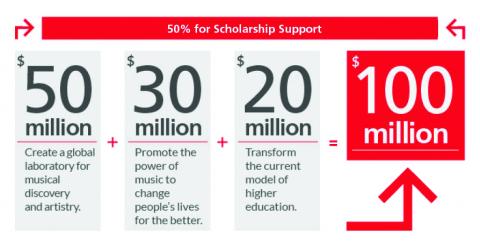Soundbreaking: The Campaign for Berklee
On June 12, President Roger Brown announced the launch of “Soundbreaking: The Campaign for Berklee.” This campaign has the ambitious goal of raising $100 million, with half for scholarships and financial aid for students.
“Soundbreaking has a Berklee-like quality,” says Berklee President Roger Brown. “Breaking implies innovation—something new, something iconoclastic, something that hasn’t been done before. And sound is what we’re all about. But sound is also a metaphor for a strong, stable institution. Soundbreaking is what we’re hoping to be, both literally, with a brand-new building, and metaphorically, with new programs and innovation.”

Soundbreaking encompasses three themes: (1) creating a global laboratory for music discovery and artistry, (2) harnessing the power of music to change people’s lives for the better, and (3) transforming the current model of higher education.
What most people know about Berklee represents just a fraction of what our energizing, entrepreneurial college is and does. Some may know that our alumni have won 239 Grammys but know little about others’ successful accomplishments in other areas of focus for the campaign. Here are some examples.
Musical Discovery
Performers, engineers, producers, and music business majors—often with support from expert faculty members—work together to create a global laboratory for music discovery and artistry, on the school’s campuses in Boston and Valencia, Spain; and around the world, reshaping the way that music is performed, presented, and purchased.
Changing Lives for the Better
Students with degrees in music therapy, education or engineering promote compassionate use of music to change people’s lives for the better: Music therapists help soldiers returning from Iraq and Afghanistan to overcome post-traumatic stress disorder or revive Alzheimer’s patients’ memories or work with children on the autism spectrum, opening new doors for learning and socializing through music. Educators bring music instruction to schools across the globe, often reaching and having an impact on the world’s neediest students. Engineers have developed assistive technology software to make Berklee courses accessible to our talented blind students.
A New Model
Integral to all that we do is our unceasing focus on transforming the current model of higher education to promote learning among the world’s most talented music students while reducing the total cost of education.
A Berklee education comprises equal parts inspiration and exploration. The journey toward the music of tomorrow begins, fueled by the creative collisions between brilliant faculty and exceptional students, diverse genres and global traditions, and artistic imagination and advanced technology.
“I believe that teaching is a two-way street: We learn from and inspire each other,” says Danilo Pérez ’88, the artistic director at the Berklee Global Jazz Institute, which is one of seven institutes that transform the way Berklee teaches and students learn. “It’s important to nurture these young players because they are the future leaders.”
Music entertains and enriches. Because of this, musicians not only perform but also serve. For our students, a Berklee education is not an end in itself but a means: a calling to use their artistry in ways that inspire individuals and strengthen communities. Through initiatives such as Berklee City Music Program, Amp Up NYC, and PULSE, Berklee brings music instruction to urban schoolchildren; through our music therapy program, we promote the power of music as a healing medium.
“We take our students to perform in retirement homes, hospitals, and museums,” Pérez says. “Musicians must draw from all their experiences; the more experiences they have, the better stories they can tell.”
As spiraling costs make it increasingly difficult for even the most deserving young musicians to attend or stay in college, those who graduate often find themselves burdened with significant debt. Berklee considers both of these dilemmas unacceptable. Through a range of strategies and offerings—including scholarships, online education, articulation agreements, and an expanding global footprint—Berklee is opening doors and toppling barriers to higher education.
“In the last decade, Berklee has tripled the amount of scholarship and financial aid support we offer to our students,” President Brown says. “Graduation rates are at an all-time high. It has made a big difference for our students, but we still have a long way to go.”
No matter the amount, a contribution to Berklee’s Soundbreaking campaign will have a major impact. We hope to direct half the campaign’s goal—or $50 million—toward scholarships, enabling extraordinary musicians from around the world to study at Berklee where they will work to make their dreams come true. This will help Berklee to attract and retain deserving students by reducing financial barriers and rewarding exceptional talent.
A Breakthrough
Our students, faculty, and alumni are creating the music of tomorrow and helping to heal our world today. Yet every creative venture requires collaborators. We invite you to join us in this groundbreaking—no, Soundbreaking—initiative to bring the power of music to bear as an uplifting force in the lives of individuals and connecting communities across the globe.
“It’s a breakthrough. It’s a willingness to accelerate, not see the limits, do things that other people haven’t done, do things that we’ve never done before,” Brown says.
“But we need the fuel to help us get this done. Giving to Soundbreaking is very important. And I’d ask everybody to step up and help us make this happen.”



